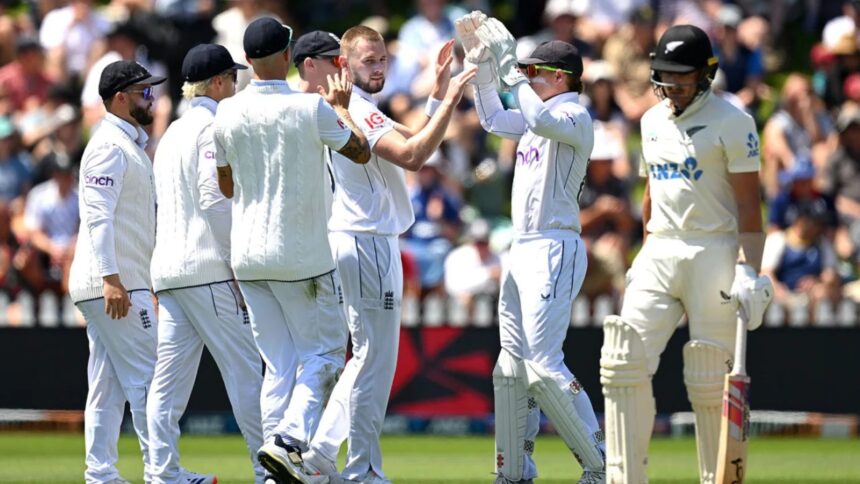Introduction: When the Batting Collapses
Test cricket is known for its resilience, strategy, and the ultimate test of a batsman’s technique. But even in the longest and most patient format of the game, there are moments when batting sides completely fall apart. The lowest score in Test cricket stands as a stark reminder that even the best teams can crumble under pressure, pace, or spin. This article explores the lowest innings totals ever recorded in Test cricket history, the context in which they happened, and how they continue to stand as cautionary tales.
What Is the Lowest Score in Test Cricket History?
The lowest team total in Test cricket history is 26 runs, scored by New Zealand against England in Auckland in March 1955. This remains the smallest total by any team in a completed innings in the 147-year history of Test cricket.
Match Summary
- Match: New Zealand vs England
- Venue: Eden Park, Auckland
- Date: March 25–28, 1955
- Score: New Zealand all out for 26 in their second innings
- Top scorer: Bert Sutcliffe (11 runs)
- Bowling figures: England’s Tony Lock (4/7) and Brian Statham (3/9)
New Zealand’s collapse came in just 27 overs, and they lost the match by an innings and 20 runs.
Top 5 Lowest Scores in Test Cricket
| Rank | Team | Score | Opponent | Venue | Year |
|---|---|---|---|---|---|
| 1 | New Zealand | 26 | England | Auckland | 1955 |
| 2 | South Africa | 30 | England | Birmingham | 1924 |
| 3 | South Africa | 30 | England | Port Elizabeth | 1896 |
| 4 | Australia | 36 | England | Birmingham | 1902 |
| 5 | Ireland | 38 | England | Lord’s | 2019 |
These scores highlight how Test cricket can expose even the strongest batting line-ups when conditions and pressure align.
Read Also: Why Sportsmen Use Shoes with Spikes: Function, Benefits, and Sports Applications
Most Recent Lowest Score: India All Out for 36 (2020)
In modern Test history, one of the most shocking collapses occurred in December 2020, when India were bowled out for 36 against Australia in Adelaide. It was India’s lowest-ever total in Tests and the lowest by any team in 65 years.
- Match: India vs Australia, 1st Test, 2020–21 Border-Gavaskar Trophy
- Venue: Adelaide Oval
- Top scorer: Mayank Agarwal (9 runs)
- Bowling highlight: Josh Hazlewood (5/8), Pat Cummins (4/21)
The collapse sparked major headlines worldwide, especially as India had led the match after the first innings.
Factors That Lead to Low Team Totals
1. Bowling Dominance
Exceptional bowling performances, especially with the new ball or in helpful conditions (swing, seam, spin), often lead to massive collapses.
2. Pitch Conditions
Green-tops, damp surfaces, or uneven bounce can result in batters struggling to stay at the crease.
3. Mental Pressure
Early dismissals and scoreboard pressure often trigger panic, leading to poor shot selection and quick wickets.
4. Lack of Application
Teams can sometimes be overly aggressive or too defensive, both of which can backfire depending on the game scenario.
Other Notable Batting Collapses
- Bangladesh – 43 all out vs West Indies (2018)
- Pakistan – 49 all out vs South Africa (2013)
- England – 46 all out vs West Indies (1994)
- India – 42 all out vs England (1974), famously called the “Summer of 42”
Lowest Totals by Major Teams
| Team | Lowest Score | Opponent | Year |
|---|---|---|---|
| India | 36 | Australia | 2020 |
| Australia | 36 | England | 1902 |
| England | 45 | Australia | 1887 |
| South Africa | 30 | England | 1896, 1924 |
| Pakistan | 49 | South Africa | 2013 |
| West Indies | 47 | England | 2004 |
| Sri Lanka | 71 | Pakistan | 1994 |
| Bangladesh | 43 | West Indies | 2018 |
| New Zealand | 26 | England | 1955 |
| Zimbabwe | 51 | New Zealand | 2005 |
| Ireland | 38 | England | 2019 |
| Afghanistan | 103 | India | 2018 (only one Test played at the time) |
Can These Records Be Broken?
While low scores like these are rare in today’s Test cricket, they are still possible. Improved batting techniques and better pitches have reduced the frequency of collapses, but hostile conditions—such as overcast skies, swinging balls, or spinning pitches—can still produce such outcomes. Teams like Ireland, Bangladesh, or even top-tier nations on difficult foreign tours remain susceptible.
Conclusion
The lowest score in Test cricket, 26 by New Zealand in 1955, remains a haunting reminder of the game’s unpredictability. Whether it’s due to world-class bowling or fragile batting, these moments live long in cricket folklore. While modern players have better tools and techniques, Test cricket still holds the ability to humble even the best sides, one over at a time. These records, though unwanted, are a vital part of the game’s rich and often brutal history.
FAQs
Q1: Which team has the lowest total in Test cricket history?
A: New Zealand, with 26 runs against England in 1955.
Q2: What is India’s lowest Test score?
A: 36 all out against Australia in 2020 at Adelaide.
Q3: Has any team been bowled out under 30 twice?
A: Yes, South Africa was bowled out for 30 runs twice—once in 1896 and again in 1924.
Q4: Are low scores common in Test cricket today?
A: No, with improved pitches and better batting depth, scores below 100 are rare but still possible under extreme conditions.
Q5: What is the lowest score in a completed Test innings at Lord’s?
A: Ireland’s 38 all out against England in 2019.












